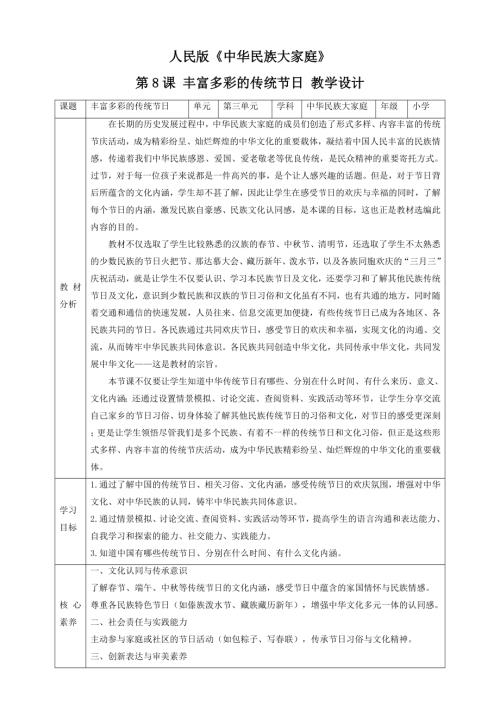 人教版PEP六年級(jí)下冊(cè)英語(yǔ)Unit2 第二課時(shí) 教案 教案
人教版PEP六年級(jí)下冊(cè)英語(yǔ)Unit2 第二課時(shí) 教案 教案
第二課時(shí)課時(shí)內(nèi)容A Lets try Lets talk課時(shí)分析本課時(shí)是人教版六年級(jí)下冊(cè)第二單元的第二課時(shí),與第一課時(shí)緊密相連,圍繞“Last Weekend”展開(kāi)話(huà)題。本節(jié)課主要是通過(guò)打電話(huà)的情景學(xué)會(huì)如何用英語(yǔ)表達(dá)周末過(guò)得怎么樣? 周末做了哪些事情?你還做了其它什么事情嗎?激發(fā)學(xué)生學(xué)習(xí)英語(yǔ)的興趣。在第一課時(shí)中句型How was your weekend? It was What did you do? I的學(xué)習(xí),為本課時(shí)奠定了基礎(chǔ)。學(xué)生對(duì)于How was your weekend? It was What did you do? I的句型掌握的比較熟練。本課時(shí)的重點(diǎn)是Did you do anything else?的理解和How was your weekend? It was What did you do? I在情景中的運(yùn)用。本課時(shí)包括Lets try 和Lets talk 兩個(gè)板塊。Lets try是聽(tīng)力訓(xùn)練,呈現(xiàn)的是Mike和Sarah打電話(huà)聊天的情景。通過(guò)聽(tīng)力的練習(xí),體會(huì)三種時(shí)態(tài)的不同語(yǔ)用環(huán)境,為下一步Mike打電話(huà)給爺爺做鋪墊,為進(jìn)入正式的的對(duì)話(huà)學(xué)習(xí)做好準(zhǔn)備。Lets talk呈現(xiàn)的是Mike和Grandpa在電話(huà)里談?wù)撝苣┗顒?dòng)的場(chǎng)景。情景設(shè)置很真實(shí),學(xué)生們都非常感興趣,激發(fā)了學(xué)生學(xué)習(xí)的熱情和想要用英語(yǔ)表達(dá)的欲望。本課時(shí)出現(xiàn)的短語(yǔ)stayed at home, watched TV, cleaned my room, washed my clothes在第一課時(shí)已經(jīng)學(xué)過(guò),drank的原形drink, childrens show在四、五年級(jí)也學(xué)過(guò),所以本課的知識(shí)學(xué)生比較容易接收。教學(xué)本課時(shí),我采用先做一做、說(shuō)一說(shuō)、答一答的方式復(fù)習(xí)前面所學(xué)的知識(shí),幫助學(xué)生回憶和鞏固。然后引導(dǎo)學(xué)生采用自主學(xué)習(xí)、教師引導(dǎo)的方式,幫助學(xué)生更好的理解和運(yùn)用語(yǔ)言。最后在通過(guò)“我是小記者”的活動(dòng)鞏固和運(yùn)用語(yǔ)言。課時(shí)目標(biāo)1. 能夠聽(tīng)、說(shuō)、認(rèn)讀單詞和詞組:drank, Childrens show, anything else2. 能夠聽(tīng)、說(shuō)、讀、寫(xiě)句型:How was your weekend? It was good. What did you do? I stayed at home with your grandma. Did you do anything else?3. 能夠很好的完成Lets try。 4. 能夠用正確的語(yǔ)音、語(yǔ)調(diào)朗讀對(duì)話(huà),并能進(jìn)行角色表演。5. 能夠在圖片和教師的幫助下理解對(duì)話(huà)大意。6. 鼓勵(lì)學(xué)生大膽發(fā)言,激發(fā)學(xué)生用英語(yǔ)表達(dá)的熱情。課時(shí)重難點(diǎn)1.重點(diǎn)(1)能夠聽(tīng)、說(shuō)、認(rèn)讀單詞和詞組:drank, Childrens show, anything else(2)能夠聽(tīng)、說(shuō)、讀、寫(xiě)句型:How was your weekend? It was good. What did you do? I stayed at home with your grandma. Did you do anything else?(3)能能夠用正確的語(yǔ)音、語(yǔ)調(diào)朗讀對(duì)話(huà),并能進(jìn)行角色表演。(4)能夠在圖片和教師的幫助下理解對(duì)話(huà)大意。2.難點(diǎn)(1)單詞drank的發(fā)音。(2)在情景中恰當(dāng)?shù)倪\(yùn)用句型How was your weekend? It was good. What did you do? I stayed at home with your grandma. Did you do anything else?教學(xué)準(zhǔn)備多媒體課件、詞卡、錄音機(jī)、磁帶、教學(xué)過(guò)程Step 1 Warm upGreetingT: Good morning, everyone.Ss: Good morning, teacher.T: Nice to see you again.Ss: Nice to see you, too.T: Boys and girls, lets sing a song ”How are you today?”Ss: Ok. T/Ss: “How are you, how are you, how are you today? Im fine, thanks, Im fine, thanks. Have a lovely day(播放錄音,師生共唱歌曲。)教學(xué)資源:課件設(shè)計(jì)意圖:師生共唱歌曲,既拉進(jìn)了與學(xué)生之間的距離,活躍了課堂氣氛,又讓學(xué)生盡快地融入到課堂之中。Step 2 Lead in1. Review some phrases.a. T: Great! Everyone, now I have some word cards. Lets say and do. 教師展示詞卡watch TV, 學(xué)生說(shuō)出它的過(guò)去式watched, watched, watched TV,看電視,并做出看電視的動(dòng)作b. 教師依次展示stay at home, wash my clothes, clean my room的短語(yǔ)詞卡,學(xué)生說(shuō)出動(dòng)詞的過(guò)去式和漢語(yǔ),然后做出相應(yīng)的動(dòng)作。c. 學(xué)生齊讀短語(yǔ)” watched TV, stayed at home, washed my clothes, cleaned my room”。教學(xué)資源:詞卡設(shè)計(jì)意圖:認(rèn)詞卡做動(dòng)作,活潑的操練形式復(fù)習(xí)和鞏固了上節(jié)課所學(xué)的短語(yǔ)。2. Ask and answer.T: I listened to music and watched TV last weekend. My weekend was fun. How was your weekend?S1: It was Ok.T: What did you do?S1: I (師生操練句型,生生操練句型。)設(shè)計(jì)意圖:句型問(wèn)答既可以看出對(duì)上節(jié)課所學(xué)句型學(xué)生的掌握程度,為學(xué)習(xí)新知做好心理準(zhǔn)備。Step 3 Presentation1. Lets try.T: Sarah and Mike are talking about this weekend. What do they say? Lets listen to the tape.(1)學(xué)生讀題猜測(cè)答案。(2)播放錄音,圈出答案。(3)校對(duì)答案。教學(xué)資源:錄音機(jī)、磁帶設(shè)計(jì)意圖:先預(yù)測(cè),做到有目的聽(tīng)錄音,提高聽(tīng)力的技巧。并且通過(guò)聽(tīng)力練習(xí)體會(huì)三種時(shí)態(tài)的不同御用環(huán)境,為進(jìn)入正式的對(duì)話(huà)學(xué)習(xí)做好準(zhǔn)備。2. Lets talk.T: Mike is calling his grandpa. (利用課件展示教學(xué)插圖。)Theyre talking about last weekend.(用日歷幫助學(xué)生理解last weekend。)What did they do last weekend? Lets have a look together.(1)整體感知對(duì)話(huà)。a. 出示表格,學(xué)生瀏覽課文,填表格。HowWhoWhatGrandpaMikeb. 指名回答教師提出的問(wèn)題。T: How was Mikes weekend? S1: It was nice.(將nice填入表格。)T: How was Grandpas weekend?S2: It was good.(將good填入表格。)T:Lets read the sentences together.Ss: How was your weekend? It was good. (全班齊讀課文中的原句,板書(shū)句型)。(2)理解、分析重點(diǎn)生詞和核心句型,并完成表格。a. Learn the new word.T: What did Mikes grandpa do last weekend?S1:He stayed at home with Mikes grandma. (全班齊讀課文原句,板書(shū)句型,并將stayed at home填入表格。)T:What else? 引導(dǎo)學(xué)生說(shuō)出 He drank tea in the afternoon and watched TV.(展示詞卡drank, 通過(guò)動(dòng)作幫助學(xué)生理解drank,教讀drank-drink,跟讀,拼讀,指名讀,齊讀句子,將drank tea填入表格。)b. Learn new phrases and sentence.T: What did Mike do? 引導(dǎo)學(xué)生說(shuō)出He watched some Childrens shows on TV.(展示詞卡Childrens show, 教讀,領(lǐng)讀,出示動(dòng)畫(huà)節(jié)目幫助學(xué)生理解。齊讀句子,將watched some Childrens shows on TV填入表格。)T: Did he do anything else?(全班齊讀課文原句,板書(shū)句型。理解anything else,領(lǐng)讀anything else,指名讀,齊讀句子,理解句子。)Ss:Yes. (板書(shū)句型。) He cleaned his room and washed his clothes.(將cleaned his room,washed his clothes填入表格。)(3) Listen to the tape and follow the tape.(4) Read in role.兩人分角色朗讀課文。 男生女生分角色朗讀課文。(5) Act the dialogue.教學(xué)資源:課件、錄音機(jī)、磁帶設(shè)計(jì)意圖:處理本環(huán)節(jié),我采取先整體感知對(duì)話(huà)初步體驗(yàn),再抓住重點(diǎn)處理局部語(yǔ)言,然后又整體把握。相互滲透,培養(yǎng)學(xué)生的閱讀能力。Step 4 Practice1. Make a new dialogue.a. 呈現(xiàn)Mikes grandma周末活動(dòng)的圖片。兩人一組,一人是Mike, 另一人是Mikes grandma。根據(jù)提供的句型創(chuàng)編新的對(duì)話(huà)。參考句型:Hi, How are you? How was your weekend?Im fine, thank you. It was .What did you do?IDid you do anything else?Wow! You are a good boy/girl.What are you going to do next weekend?Im going to Thats good.b. 指組表演對(duì)話(huà)。設(shè)計(jì)意圖:設(shè)置情境,提供句型讓學(xué)生有意識(shí)的創(chuàng)編對(duì)話(huà),讓所學(xué)句型得到了運(yùn)用和鞏固。2. 活動(dòng)“我是小記者。”采訪班里的一名同學(xué),并寫(xiě)一寫(xiě)他/她的活動(dòng)安排。參考句型:Hi, How was your weekend?What did you do last weekend?Did you do anything else?活動(dòng)安排:_______ was _______ last weekend. He/ She________________. He/ She _______________. He/ She is going to________________.設(shè)計(jì)意圖:“我是小記者”的活動(dòng),把語(yǔ)言的聽(tīng)、說(shuō)、讀、寫(xiě)結(jié)合起來(lái),鍛煉了學(xué)生的口語(yǔ)表達(dá)能力,提高了聽(tīng)和寫(xiě)的能力。Step 5 SummaryT: Boys and girls, which new phrases did you learn about this lesson? Ss: Drank tea, Childrens show, anything else.T: Which sentences did you learn?(Point to the blackboard.)Ss: How was your weekend? It was _____.What did you do last weekend? I ________.Did you do anything else? Yes. I_______.設(shè)計(jì)意圖:教師幫助學(xué)生歸納和整理本節(jié)課的重點(diǎn)知識(shí),加深學(xué)生對(duì)知識(shí)的記憶。課堂作業(yè)一、將左欄與右欄連線(xiàn)組成短語(yǔ),并選擇相符的圖片。 欄 欄1. watched A. my room ________2. drank B. tea ________3. washed C. my clothes ________4. cleaned D. TV ________a. b. c. d.二、單項(xiàng)選擇。( )1. Mike stayed ________ home and listened to music.A. to B. at C. in( )2.How are you, Amy?________A. It was good, thanks. B. Im fine, thanks. C. Nice to meet you.( )3. Im going to ________ football next weekend.A. play B. played C. played the( )4. I ________ some Childrens shows on TV last weekend.A. watch B. watched C. watches( )5. We drank water ________the afternoon.A. in B. on C. at三、將下列的單詞寶寶連詞成句,并選出正確的答語(yǔ)。( )1. was, how, weekend, your(?)________________________________________________( )2. did, anything, you, do, else(?)________________________________________________( )3. did, what, do, you, weekend, last(?)________________________________________________A. Yes, I did. B. It was nice.C. I visited my grandparents.Answers:一、1. D-a 2. B-c 3. C-d 4. A-b二、1. B 2. B 3. A 4. B 5. A三、1. How was your weekend? B 2. Did you do anything else? A 3. What did you do last weekend? C板書(shū)設(shè)計(jì)A Lets talk How was your weekend? It was _____. drinkWhat did you do last weekend? I ________. drank tea Did you do anything else? Yes. I_______. 喝茶其它的一些事情 Childrens show兒童節(jié)目5
- 關(guān) 鍵 詞:
- 人教版PEP六年級(jí)下冊(cè)英語(yǔ)Unit2 第二課時(shí) 教案 人教版 PEP 六年級(jí) 下冊(cè) 英語(yǔ) Unit2 第二 課時(shí)
 叮當(dāng)云教育所有資源均是用戶(hù)自行上傳分享,僅供網(wǎng)友學(xué)習(xí)交流,未經(jīng)上傳用戶(hù)書(shū)面授權(quán),請(qǐng)勿作他用。
叮當(dāng)云教育所有資源均是用戶(hù)自行上傳分享,僅供網(wǎng)友學(xué)習(xí)交流,未經(jīng)上傳用戶(hù)書(shū)面授權(quán),請(qǐng)勿作他用。 關(guān)于本文
相關(guān)資源
 人教版(PEP)六年級(jí)下冊(cè)英語(yǔ)(教案+課件+試題等)
人教版(PEP)六年級(jí)下冊(cè)英語(yǔ)(教案+課件+試題等)  2023——2024學(xué)年度人教PEP六年級(jí)第二學(xué)期期末考題.docx
2023——2024學(xué)年度人教PEP六年級(jí)第二學(xué)期期末考題.docx  人教版六年級(jí)下冊(cè)英語(yǔ)形容詞、副詞專(zhuān)項(xiàng) 課件.pptx
人教版六年級(jí)下冊(cè)英語(yǔ)形容詞、副詞專(zhuān)項(xiàng) 課件.pptx  人教版六年級(jí)下冊(cè)英語(yǔ)字母、語(yǔ)音專(zhuān)項(xiàng) 課件.pptx
人教版六年級(jí)下冊(cè)英語(yǔ)字母、語(yǔ)音專(zhuān)項(xiàng) 課件.pptx  人教版六年級(jí)下冊(cè)英語(yǔ)疑問(wèn)句專(zhuān)項(xiàng) 課件.ppt
人教版六年級(jí)下冊(cè)英語(yǔ)疑問(wèn)句專(zhuān)項(xiàng) 課件.ppt  人教版六年級(jí)下冊(cè)英語(yǔ)聽(tīng)力專(zhuān)項(xiàng)(二) 課件.ppt
人教版六年級(jí)下冊(cè)英語(yǔ)聽(tīng)力專(zhuān)項(xiàng)(二) 課件.ppt  人教版六年級(jí)下冊(cè)英語(yǔ)綜合填空專(zhuān)項(xiàng) 課件.ppt
人教版六年級(jí)下冊(cè)英語(yǔ)綜合填空專(zhuān)項(xiàng) 課件.ppt  人教版六年級(jí)下冊(cè)英語(yǔ)時(shí)態(tài)專(zhuān)項(xiàng) 課件.ppt
人教版六年級(jí)下冊(cè)英語(yǔ)時(shí)態(tài)專(zhuān)項(xiàng) 課件.ppt  人教版六年級(jí)下冊(cè)英語(yǔ)情景交際專(zhuān)項(xiàng) 課件.ppt
人教版六年級(jí)下冊(cè)英語(yǔ)情景交際專(zhuān)項(xiàng) 課件.ppt  人教版六年級(jí)下冊(cè)英語(yǔ)閱讀理解專(zhuān)項(xiàng)(二) 課件.ppt
人教版六年級(jí)下冊(cè)英語(yǔ)閱讀理解專(zhuān)項(xiàng)(二) 課件.ppt  人教版六年級(jí)下冊(cè)英語(yǔ)名詞、冠詞專(zhuān)項(xiàng) 課件.pptx
人教版六年級(jí)下冊(cè)英語(yǔ)名詞、冠詞專(zhuān)項(xiàng) 課件.pptx 


 24秋新一年級(jí)上冊(cè)語(yǔ)文2 江南(朗讀音頻).mp3
24秋新一年級(jí)上冊(cè)語(yǔ)文2 江南(朗讀音頻).mp3  人民版《中華民族大家庭》第4課我們都是中國(guó)公民 課件.pptx
人民版《中華民族大家庭》第4課我們都是中國(guó)公民 課件.pptx  人民版《中華民族大家庭》第6課 共同建設(shè)美好家園 課件.pptx
人民版《中華民族大家庭》第6課 共同建設(shè)美好家園 課件.pptx  人民版《中華民族大家庭》第8課 豐富多彩的傳統(tǒng)節(jié)日 課件.pptx
人民版《中華民族大家庭》第8課 豐富多彩的傳統(tǒng)節(jié)日 課件.pptx  人民版《中華民族大家庭》第7課 中華民族的語(yǔ)言文字 課件.pptx
人民版《中華民族大家庭》第7課 中華民族的語(yǔ)言文字 課件.pptx  人民版《中華民族大家庭》第4課我們都是中國(guó)公民 教案 核心素養(yǎng).doc
人民版《中華民族大家庭》第4課我們都是中國(guó)公民 教案 核心素養(yǎng).doc  人民版《中華民族大家庭》第5課 美麗河山我們的家 課件.pptx
人民版《中華民族大家庭》第5課 美麗河山我們的家 課件.pptx  人民版《中華民族大家庭》第8課 豐富多彩的傳統(tǒng)節(jié)日 教案 核心素養(yǎng).doc
人民版《中華民族大家庭》第8課 豐富多彩的傳統(tǒng)節(jié)日 教案 核心素養(yǎng).doc  北師大版三年級(jí)下冊(cè)心理健康第20課《班集體以我為榮》課件.pptx
北師大版三年級(jí)下冊(cè)心理健康第20課《班集體以我為榮》課件.pptx  北師大版三年級(jí)下冊(cè)心理健康第15課《真心原諒他人》課件.pptx
北師大版三年級(jí)下冊(cè)心理健康第15課《真心原諒他人》課件.pptx  北師大版三年級(jí)下冊(cè)心理健康第19課《每天自省五分鐘》課件.pptx
北師大版三年級(jí)下冊(cè)心理健康第19課《每天自省五分鐘》課件.pptx  北師大版三年級(jí)下冊(cè)心理健康第13課《學(xué)習(xí)方法提高效率》課件.pptx
北師大版三年級(jí)下冊(cè)心理健康第13課《學(xué)習(xí)方法提高效率》課件.pptx  北師大版三年級(jí)下冊(cè)心理健康第18課《這樣做才是真正的朋友》課件.pptx
北師大版三年級(jí)下冊(cè)心理健康第18課《這樣做才是真正的朋友》課件.pptx  北師大版三年級(jí)下冊(cè)心理健康第16課《防止上當(dāng)受騙》課件.pptx
北師大版三年級(jí)下冊(cè)心理健康第16課《防止上當(dāng)受騙》課件.pptx  北師大版三年級(jí)下冊(cè)心理健康第17課《和拖延說(shuō)再見(jiàn)》課件.pptx
北師大版三年級(jí)下冊(cè)心理健康第17課《和拖延說(shuō)再見(jiàn)》課件.pptx  北師大版(2019)三年級(jí)下冊(cè)心理健康課件ppt+素材(全冊(cè)打包下載).rar
北師大版(2019)三年級(jí)下冊(cè)心理健康課件ppt+素材(全冊(cè)打包下載).rar 
